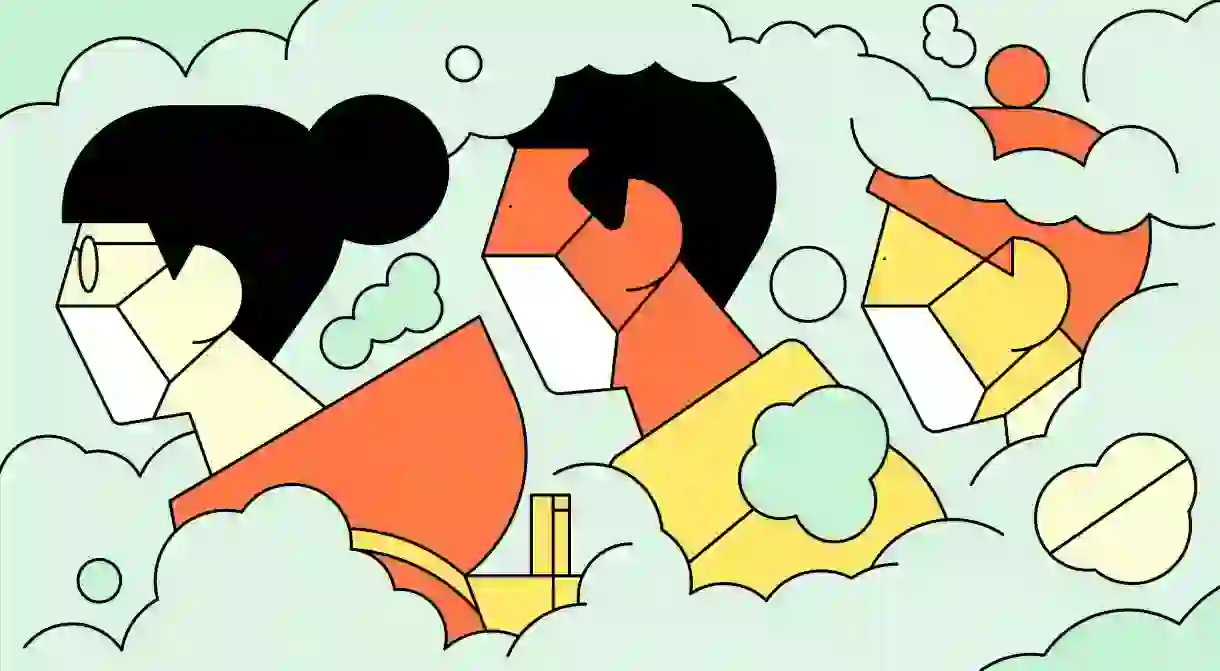10 Ways to Survive the Smog in Beijing

A typical Beijing day sees pollution levels reach far beyond the recommendations of the U.S. and European authorities. And on bad days? Visibility drops to a few hundred meters, the sun looks like a dull blurry blob, and lungs struggle for air while eyes itch and burn. Here are ten survival tips for those bad days.
Filter, filter, filter
1. Buy an air purifier. Well-known brands such as BlueAir or IQAir are not cheap — they cost thousands of yuan — but are arguably worth it simply for the peace of mind. Xiaomi is a good local option that costs less than 1000 yuan. Check to see how many units are needed to effectively clean a given apartment and that enough space is left around and above each one for adequate air circulation.
2. Make your own. The team at SmartAir found that a HEPA (high efficiency particulate absorption) filter strapped to the front of a normal electric fan is nearly as effective as the priciest air purifiers. Those who would rather not hunt down components can get a complete package from Smart Air, with units starting from as little as 200 yuan, including shipping.

3. Green your apartment. Plants help clean the air: even NASA has done research on which ones work best so that our future in space will include easier breathing. The Laitai Flower Market has options from inch-high seedlings to two-meter trees. Try ferns, spider plants and bamboo palms to start.
Enjoy home sweet home
4. Exercise indoors. It’s bad enough the pollution wreaks havoc on people’s lungs, it’s even worse that it discourages the activity to keep healthy. Pair that air purifier with a stationary bike, a treadmill or a set of weights when it gets too smoggy to exercise outside.
5. Enjoy food delivery. There are hundreds of breakfast, lunch and dinner delivery options in Beijing. Whether fast food from KFC or McDonald’s, pizza from Annie’s, Gung Ho and Pizza+, or meals from restaurants that cover everything from local cuisine to organic fare, there is no shortage of options available. You can order via phone call, Wechat or delivery services such as Sherpa.

6. Track the pollution. The U.S. Embassy in Beijing ruffled a few feathers when it started to anonymously publish pollution statistics for the city but there are now hundreds of readings available across China. Get in-depth results here, with one of many apps or with a hand-sized pollution monitoring device. That will give you an idea of when it’s safe to breath easy again.
Stay safe outdoors
7. Wear a mask. It should be rated N95 or higher, which means it removes 95 percent of particular matter 0.3 microns in size or bigger. (A strand of hair is typically 50 to 100 microns wide.) Just as important is the fit. A mask with a highly effective filter is useless unless it snugly covers the nose and mouth. Three commonly recommended mask brands are 3M, Vogmark or Respro.
8. Filter your eating options. A growing number of restaurants are responding to their customers’ pollution concerns by installing air purifiers. While the results might be less effective than at home, due to customers constantly entering and exiting, they are better than nothing. Organic restaurant Tribe and craft brew pub Jing-A are among the establishments that now have air purifiers in Beijing.
9. Get out of town. When the forecast calls for three or more days of substantial pollution, it might be time for that mini-vacation. Shanghai is only a six hour ride by high-speed rail and the air is much fresher. There are also plenty of getaways just an hour or two away by air, including South Korea.
10. Enjoy those blue sky days. When the wind sweeps away all that smog, air out the apartment, go for a run and visit the parks. Enjoy that clean air while it lasts: statistics suggest the overall pollution situation has improved during the past few years but residents can expect spells of smog for a long time to come.














